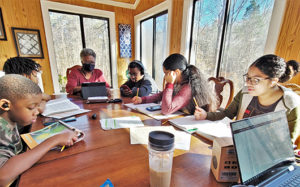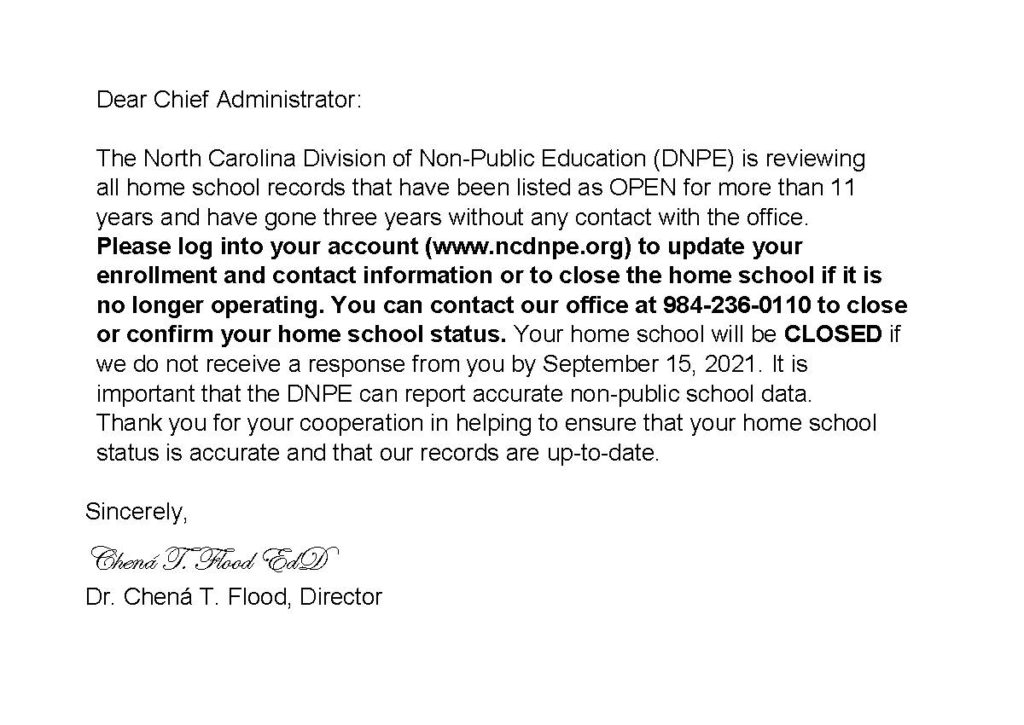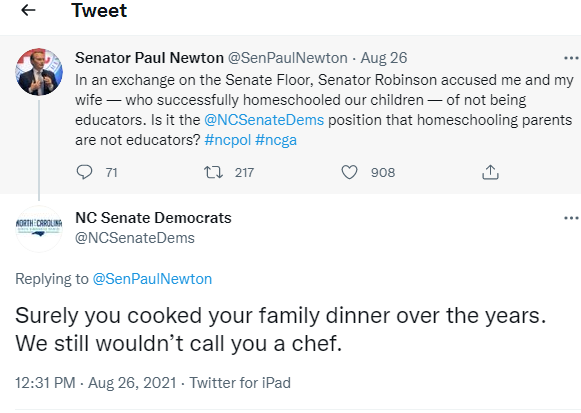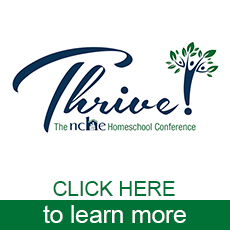
Black History Month: Notable Homeschoolers
 by Jessica Frierson, February 2022
by Jessica Frierson, February 2022
February is a great time to shine the spotlight on a few notable homeschooled black Americans. Each of these individuals defied great adversity to pursue an education for themselves and have left a legacy that impacts all of our lives today. They lived in a time when education was denied to them based on the color of their skin, yet they had an innate understanding that simply learning to read would open doors for them that would otherwise remain locked.
Today, the growth in homeschooling among black families signifies an incredible victory as they come full-circle, and parents can now hold the reins controlling their children’s education, regardless of their skin color. The low expectations that the educational system has for Black students is a common reason cited by Black parents choosing to homeschool. It also gives parents the opportunity to teach their children about their African roots, a subject typically missing in public school curriculum.
Phillis Wheatley, Benjamin Banneker, Lewis Latimer, and Frederick Douglas are among my favorite historical figures and offer commendable illustrations of the potential a self-taught individual can attain. They demonstrate the principle that a desire to learn is the most important part of an education. Limited resources, lack of support, and fears of not fitting into society’s expectations did nothing to hold them back from following their heart’s desire to learn, a lesson we would do well to remember in our homeschools today.
Phillis Wheatley
Phillis Wheatley was born in 1753 in Gambia, Africa. She was captured by slave traders in her childhood and brought to America on a ship named “the Phillis,” where she was bought by the Wheatley family. The family taught her to read, and within sixteen months, she was able to read British literature, Greek and Latin, and the Bible. Phillis developed a love for poetry and in 1767, at only 14 years old, Phillis’ first poem was published. She went on to become the first African American person, and second woman in America, to publish a book of poetry with her book “Poems on Various Subjects, Religious and Moral.” The book was published in 1783 and included a foreword by none other than John Hancock as well as a photo of Phillis as proof of her authorship. She was emancipated shortly after and went on to marry John Peters, a free Black man from Boston.
Benjamin Banneker
If you have ever visited our nation’s capital, you have traveled across the land that was surveyed by Benjamin Banneker. Born in Maryland in 1731 to an ex-slave and a former indentured servant, Benjamin was taught to read by his grandmother and, other than a short time at a Quaker school, was self-taught, borrowing books on astronomy and mathematics.
As a young man, Benjamin Banneker created a wooden clock that kept precise time for fifty years. He designed an irrigation system for his family’s farm. He became known for his accuracy in predicting solar and lunar eclipses.
Benjamin Banneker’s experience in astronomy led to his work on the surveying team that was mapping the territory of Washington, D.C. He spent three months in the observatory tent using a zenith sector to record the movement of the stars. He corresponded frequently with Benjamin Franklin. Like Franklin, Banneker published a series of almanacs, which included tidal charts for fishermen, astronomical calculations, and medical information. He also correctly calculated the life cycle of the 17-year locust and published articles on bees.
What I admire most about Benjamin Banneker however, is what he did in 1791. In a letter to Thomas Jefferson, then the Secretary of State and a slaveholder, Banneker respectfully called out the hypocrisy of Jefferson and other patriots for enslaving people like him while fighting the British for their own independence.
Lewis Latimer
Without the assistance of another home-educated Black man, the world would not equate the name Alexander Graham Bell with the telephone. Born on September 4, 1848, in Chelsea, Massachusetts, to former slaves, Lewis Latimer had to work to support his mother and siblings after his father disappeared following the 1857 Dred Scott decision. His father had been arrested after being recognized as a runaway slave. Frederick Douglass successfully defended him in court, but the Supreme Court’s ruling that enslaved people and their descendants, whether free or not, could not be American citizens and thus had no right to sue in federal court, caused Lewis’s father to fear recapture and return to slavery.
Latimer enlisted with the US Navy in 1864 at the age of fifteen, having lied about his age. At the conclusion of the war, Latimer began work as an office assistant in a Boston patent office. Latimer studied the drafters at work in the firm, learning enough about the mechanics of drawing and drafting to eventually be promoted to the position of head drafter.
Shortly thereafter, an instructor of hearing-impaired children sought out Latimer’s drafting skills to provide drawings of a device that the man had created. With Latimer’s help, Alexander Graham Bell was able to submit the patent application for the telephone on February 14, 1875, just a few hours before an application was submitted for a similar device by another inventor.
Lewis Latimer also had a hand in the invention of the light bulb. Thomas Edison’s bulb had a very short life span. Lattimore developed a way to give the bulbs a much longer life, making them both less expensive and more efficient. He continued “to improve on incandescent lighting as well as arc lighting. As more major cities began wiring their roadways for electric lighting, Latimer was selected to lead several planning teams. He helped install the first electric plants in Philadelphia, New York City, and Montreal. He also oversaw the installation of lighting in railroad stations, government buildings, and major thoroughfares in Canada, New England, and London.”
Eventually, Latimer began working with Edison himself and was the only Black member of a group of men who had worked closely with Edison in his early years, known as the “Edison Pioneers.” Other innovations by Latimer include a safety elevator; locking racks for hats, coats, and umbrellas that were used in restaurants and office buildings; and a method for making rooms more hygienic and climate-controlled.
Frederick Douglas
“Knowledge is the pathway from slavery to freedom,” was a maxim that Frederick Douglas lived by. Born into slavery, not even knowing the date of his birth, and separated from his mother from infancy, Frederick Douglass was moved to the Wye House Plantation at the age of 6 and then given to the Auld family in 1826. Sophia Auld began teaching the alphabet to Frederick when he was around 12, but soon stopped when her husband convinced her that literacy would encourage slaves to desire freedom. Overhearing this, Frederick later remembered the incident as the “first decidedly anti-slavery lecture” he had ever heard. “‘Very well, thought I,'” wrote Douglass. “‘Knowledge unfits a child to be a slave.’ I instinctively assented to the proposition, and from that moment I understood the direct pathway from slavery to freedom.”
Although his owners proceeded to hide the Bible and any other reading materials from Frederick, he continued to secretly learn from neighboring White children and any written works he could get his hands on. When he was hired out to a nearby plantation, Frederick began teaching other slaves to read at a weekly Bible study lesson, with up to 40 slaves in attendance each week. The discovery of this led to Frederick being sent to a “slave breaker” where he suffered brutal beatings.
In 1838 Frederick Douglass escaped from slavery – not by way of the Underground Railroad, as you might expect – but by riding a train from his home state of Maryland to the end of the line in Delaware. From there, he took a steamboat to reach Philadelphia, PA, and finally arrived safely in New York City.
Frederick Douglas went on to become a world-renowned abolitionist, writer, orator, and preacher. He traveled to Great Britain, Ireland, and Scotland. He joined the suffrage movement to give women the right to vote. He was an early advocate for schools to be desegregated. He was the most photographed person of the 19th century, believing that photography was a powerful tool in ending slavery and racism.
With its origin dating back to 1926, Black History Month is an opportunity to highlight the accomplishments of Black Americans and celebrate their many contributions to the world. As a homeschool community, we can be inspired by the achievements of Wheatley, Douglass, Latimer, Banneker and the vast number of self-taught Black men and women who utilized whatever means they could to attain an education.
How Long? O Lord, How Long? A Christmas Devotional
 by Jessica Frierson, Dec 21
by Jessica Frierson, Dec 21
How long, Lord, how long? Is there anyone who has not asked that soul-wrenching question? How many of you are asking it at this very moment?
One of my favorite segments of the Christmas story is not even in the part usually read and dramatized at our Advent celebrations. And yet, it illustrates so beautifully the very essence of the Advent season.
Our story takes place 40 days after the birth of Jesus, as Joseph and Mary bring their new baby to the temple for his dedication. (I love the incredible irony here – “to present Him to the Lord.” They are bringing the Lord to present Him to…. the Lord!)
Waiting on the sidelines until his cue to step onto the stage is a patient old man, “just” and “devout” and “the Holy Spirit was upon him.” Simeon has been waiting…waiting for the Consolation of Israel, referring to the comfort promised in Isaiah 40 that Messiah would bring to His people. All of Israel was looking for the promised Messiah, but Simeon was waiting for the fulfillment of a personal promise.
“It had been revealed to him by the Holy Spirit that he would not see death before he had seen the Lord’s Christ.” Who knows how long this man had been waiting. Scripture does not tell us when he received this revelation. It may have been years or even decades. We do know that he is now an old man because after finding the baby Jesus there in his mother’s arms, he prays, “Lord, now You are letting your servant depart in peace…”. Apparently he has been ready to die but waiting to see this baby, the Christ.
Isn’t it curious that this occurs 40 days after the birth? Why wasn’t he on the birth announcement list? Lowly shepherds were heralded by a multitude of angels and this devout man, covered by the Holy Spirit, awaiting the Messiah so he could depart from this life has to wait another 40 days? Didn’t he deserve at least a little hint, “Simeon, the baby has been born and you will get to meet him soon.” No, he waits another 40 days until Joseph and Mary bring Him in to make the offering required by Jewish law for the first-born male.
Have you ever felt that way, that you have waited long enough for God to reveal Himself to you? That the time has really come for Him to move? Have you ever waited so long that you are beginning to doubt it is ever going to happen? Maybe you are feeling that way now. Perhaps you are in the midst of a situation where you really need God to help you, to guide you, to fix the desperate circumstances you face. Do you feel like David who cried out in Psalm 13:1, ”How long, O Lord? Will you forget me forever? How long will you hide Your face from me?”
Did Simeon ask these questions? I think we all do from time to time. King David certainly did. We have quite a few of his psalms that repeat the question, “How long?”. And then we have psalm after psalm that declare God’s faithfulness and goodness. These psalms show us that it is natural to have those feelings and to encourage us that God does hear and He does see.
How many times did Simeon come to the temple in anticipation that today might be The Day? Perhaps even as he was awaiting the fulfillment of the Messiah promised in the first two verses of Isaiah 40, he was also remembering the rest of the chapter, the part we so often hear quoted today: “But those who wait upon the Lord shall renew their strength; they shall mount up with wings like eagles, they shall run and not be weary, they shall walk and not faint.” Patient Simeon, waiting on the promise, his strength renewed each day to make his trek to the temple to see if the Christ would be revealed….and this morning, “he came by the Spirit, into the temple. And when the parents brought in the Christ child, to do for Him according to the law, he took Him up in his arms and blessed God…”
This is what faith does in us. It pulls us out of bed when we don’t feel like we can face another day. Faith keeps us going back to that place of expectation, again and again, because Today. Just. May. Be. The Day. When we have nothing to hold in our hands or set our eyes on, the evidence we have that God is at work is our faith. Faith is “the divinely implanted principle of inward confidence, assurance, trust, and reliance in God and all that He says” according to the editors of the New King James Spirit-filled Life Bible.
Do you need an implant in your heart today? When it seems that God has held back the fulfillment of His promise…
When you feel like He has hidden His face from you…
When you have prayed… and prayed… and prayed …
Remember the hope of Christmas:
– a shepherd king crying out his own doubts and fears and answered by his own great-great-great…. great grandson
– an old man waiting on the sidelines (for an extra 40 days, no less!)
– 400 years of silence broken by a baby’s cry
– a young mother fulfilling the requirement of the law by bringing in the very One who was the complete fulfillment of the law itself
– the long-awaited Messiah, the Promised One, the Hope of Israel.
“Be of good courage and He will strengthen your heart, all you who hope in the Lord.” Psalm 31:24
Preserving Our Values through Home Education
We are part of a powerful, growing state and national homeschooling movement. And that was the case even before the coronavirus! Now, more families than ever are homeschooling and benefiting from this life-changing choice. North Carolina is second only to Alaska in percent of the population homeschooling (statistics), and our freedoms here are some of the best in the nation.
We are also at a time of significant cultural change in our nation. There are those who value our constitutional rights, traditional family structures, the sanctity of life, and the authority of parents in the lives of their children and there are those who don’t. There is also a growing belief that the government should make decisions about how our children are educated. This divide is affecting what is being taught in public schools and many parents are homeschooling because they don’t want these things taught to their children. In this video, our executive director, Matthew McDill talks about how home education provides a wonderful opportunity to preserve our values.
COVID was interesting in that it brought our children home from schools to online experiences where parents became unavoidably aware of what was being taught and what their children were and were not learning. In essence, remote learning shed light on what had been largely beyond parental view pre-COVID. Homeschooling Facebook pages were full of parents’ exclamations of shock at what their children did not know, as well as statements of frustration with things they were being taught that were elements of social indoctrination.
In North Carolina, there have been places where young students have been taken in for private interviews without parental consent or presence where they have been asked about things like family views on race and gender (article). In Charlotte, teachers have been encouraged to engage students in identifying as members of the LGBTQ+ community and give them instruction on how to be activists without their parents knowledge and consent (article). Many families also recognize that the social distancing and masking of children is detrimental to their health and development as is being borne out in research (article). Other parents want masks to be mandated to protect their children from COVID. It is in the turmoil of societal values that we have seen record numbers of people turning to homeschooling as a means of deciding what their children learn and how–a means of preserving values that are important to their families.
We believe that every family should have the right to homeschool their children and pass on their own values to them. As an organization NCHE stands firmly behind the following:
- Parental Authority: The authority and responsibility of educating and raising children belongs to parents.
- Home Education: Home education is effective for establishing academic success, preparation for life, strong family relationships, and moral character.
- Biblical Christianity: We operate on the basis of biblical principles, affirm the Nicene Creed, hold to the authority of Scripture for doctrine and practice, and seek to support Christian parents in helping their children to follow Jesus Christ.
- Service to All: We serve and welcome all who support home education, regardless of race or religious affiliation.
In short, NCHE is there to assist you as you preserve your family values with regard to the education of your children. But we can’t do it alone! There are over 112,000 homeschooling families in our state. We want to reach as many of these parents as possible to help them homeschool with confidence and joy, protect their right to homeschool, equip them with information and encouragement, and connect them with other homeschoolers to mentor and support them. NCHE is taking on a monumental task!
We are a member and donor supported non-profit. We depend on you to help us preserve the rights and values of our members and all NC homeschoolers. Right now, we have a shortfall of roughly $20,000 to meet our budget by the end of the year.
Do you want us to continue the work to protect and support you in your freedom to homeschool in NC? Then please support our effort by donating to North Carolinians for Home Education today!
But don’t let it stop with you! Share this letter with someone in your corner who believes in your right to preserve family values. Maybe it’s your parents or siblings. Maybe it’s a neighbor, friend, co-worker, or fellow homeschooler. Ask them to donate out of support for you in your homeschooling journey!
Standing with you,
Diane Helfrich
NCHE Development Director
P.S. It is critical to receive your support before the end of December. Prayerfully offer your best gift today!
P.S.S. There isn’t much that is more important than your freedom to raise your children according to your own convictions. With one simple choice to donate to NCHE, you will be doing the most important thing you can do to ensure that no one takes that freedom from you in NC.
Will You Help Us with The Homeschool Show?
 by Matthew McDill, Nov 21
by Matthew McDill, Nov 21
Hopefully, you’ve already discovered The Homeschool Show! This is our most recent project to help parents homeschool with confidence and joy. This week we released episode 9, and we’ve already had guests on the show like Dr. Brian Ray (NHERI), attorney Dan Beasley (HSLDA), Yvette Hampton (of the Schoolhouse Rocked documentary), Tim Lambert (THSC), Dr. Kathy Koch (Celebrate Kids), and more! We’ve discussed current legislative issues in NC and offered lots of homeschool tips.
Would you consider helping us with the show? Here’s what you can do:
1) Watch it.
We release a new episode of the show every Monday by 9:00 am. You can watch it on the show’s homepage or on YouTube. Be sure to subscribe to our channel!
2) Share it.
Help us spread the word! When you see our Facebook and Instagram posts about the show, share them. Also, please take just a moment and share a link to the show with friends and family that you think will be interested.
3) Give us feedback.
Please let us know if you have any questions or topics you’d like us to address. And as you watch the show, if you have any ideas for how we can improve it, please email us at thehomeschoolshow@nche.com.
4) Submit videos for the Homeschool Reality Moment.
The Homeschool Reality Moment is a segment of the show when we take a look at what is going on in real homeschools in NC. This segment shows video clips of parents sharing stories and experiences from their homes that are funny, moving, and inspiring. Please record your video horizontally (not the normal way you hold your phone). We want videos about 1 to 3 minutes long. It could be just a video of you telling a story of something that happened or a conversation you had. It could be a project idea or homeschool hack that you show through the video. Remember to keep it real. Don’t forget that this will also be shared as a podcast, so be sure you are giving narration as you show something. Send your videos to thehomeschoolshow@nche.com.
5) Advertise on the show.
If you own a business (or know someone who does), please consider sponsoring or placing an advertisement on the show. You can read all about it here. The Homeschool Show is produced in the News Talk WSIC studio and broadcast at 8:30 am on Mondays in the northern Charlotte, Lake Norman, Statesville and Iredell County region. We then upload the video and audio recordings of the show to YouTube and our podcast channels. The Homeschool Show is promoted each week through our social media channels (more than 27,000 followers) and email list (more than 13,000 subscribers).
6) Donate to NCHE
If you are grateful for what NCHE does, please consider making a donation. Our mission is to help parents homeschool with confidence and joy by protecting your right to homeschool in NC, equipping you with information and encouragement, and connecting you with other families and groups.
We are currently facing a budget shortfall for 2021. Our goal is to raise $20,000 by the end of the year to close this gap. You can help us continue to serve homeschoolers, like producing The Homeschool Show, when you make a generous donation.
The Best Gift You Give Yourself
 by Diane Helfrich, November 2021
by Diane Helfrich, November 2021
Beginnings
You have made the jump and decided to homeschool. It’s exciting and scary all at once. You have so many questions: Will I fail my child? Can I manage all of this? What if I don’t do it right? What curriculum should I choose? Will my kids have access to the things I loved when I was in school? …and a hundred more questions. You are swimming in a sea of uncertainty, and, yet, you are certain that you want to move forward with homeschooling. What is my best recommendation for you? Join a support group!
When we began to homeschool, a woman at the library encouraged me to join a group. I only knew of one group which she told me about. I wasn’t sure I wanted the interruption to my week and the added commitment it would bring. Hesitantly, I jumped in; we signed up for a class that met for an hour every other week for one semester! While the commitment wasn’t significant, I almost immediately saw the value of my choice. Over time, our co-op became the source of many parts of our homeschool.
What’s in It for Me?
One would assume that the best part of joining a co-op or support group would be friends for your children. What I didn’t expect was what was there for me. I, too, needed like-minded friends on a similar journey. I was surprised at how quickly friendships formed and how much I looked forward to seeing these parents. Throughout our homeschooling time, I clung to the words spoken by parents with more experience. There were discussions of curriculum, competitions, testing, the SAT and ACT, high school transcripts, college, scholarships—endless conversations about things I needed to know over the years. Parents talked about the things they wanted their children to have, their issues, and how they dealt with them. I gravitated toward parents who had values and families I admired, and I found myself morphing to homeschool more like them over time. I needed this mentorship. I needed these friendships. My support group and my involvement made me an infinitely better homeschool parent than I would have been without them.
What’s in It for My Kids?
Of course, my kids found friends through our group; that almost goes without saying. In addition, our group provided things I was weak in (math is NOT my cup of tea!), opportunities that only work with groups such as competitions, and all sorts of enrichment activities other parents organized. We did many competitions: Math Olympiad, MathCounts, spelling bee, geography bee, science fair, National Latin Exam, Envirothon, team policy debate, and speech. We had choirs, proms, a wonderful graduation ceremony, a yearly fall barn square dance, and a multitude of field trips. My kids were on yearbook teams, gaining considerable leadership and time management skills; there was money involved and deadlines to meet. I taught classes that fit our needs and wants like philosophy, biology, chemistry, and dissection classes. These benefitted both my family and many others. Nothing was missing from our choosing to go away from traditional schooling. It was, in fact, a very learning-rich environment.
The Greater Community
It was through my support group that I became aware of NCHE and the sports offered. We went to the Thrive! Conference yearly. I was filled to the brim at these events, and I became connected with a larger pool of homeschoolers. When you walk into the Benton Convention Center filled with homeschooling families, you know you are part of something special before you even start listening to speakers! This larger community is as important as the local community. NCHE is where I became aware of the legislative support that happens for all of us without us having to do much. I now know that we have lists of groups. I happened into a great support group and co-op, but there are many, and NCHE provides a place to get connected through lists of groups. We participated in volleyball through the NCHE Athletic Commission (NCHEAC); I coached, my son was an assistant coach, and my daughter was a player. The sports gave us the final thing I was looking for to round out our experiences. Being a member of NCHE became more and more important to me because of the support for homeschoolers I witnessed.
Getting the Most from Your Group
Now for the part that many shy away from–the investment you make. Support groups require leadership and efforts from many hands to make them work. If the team you want isn’t available, COACH! If the class you want isn’t being taught, TEACH! If the prom or yearbook doesn’t exist, ORGANIZE. There will be other parents to help. As always, we get out of something what we put into it. We don’t have to know how to do it all; we can learn as we go. We have gifts to offer others, and they have the skills we need. Together, it all works. Yes, it takes time and commitment. But, through that commitment, you demonstrate to your children that nothing good comes without investment, and that is a fundamental lesson they need before they leave your nest. Serving the greater good is always something of worth to which we should aspire!
In closing, joining a group that fits your needs is the best gift you give yourself as a homeschooler. It’s a huge responsibility, and none of us does it best alone! In the world of best practices, this is a big one. So, find a group and jump in. You will be glad you did!
DNPE Has Requested to Review My Records. What Should I Do?
 By Spencer Mason, October 2021
By Spencer Mason, October 2021
The Division of Non-Public Education (DNPE) recently sent out an email to randomly selected homeschools in North Carolina requesting that they attend a virtual record review meeting. The way the email reads, it would be easy to understand this request as a legal requirement. It says, “Please note that DNPE encourages you to participate as the NC Statutes governing non-public schools (Chapter 115C Article 39; § 115C 547 – 567) require all non-public schools to make available their records upon request. An invitation to attend a record review meeting is such a request.”
It is important to note, however, that later in the email it states, “If you do not have Microsoft Teams or you prefer not to meet virtually, you may either email or mail a copy of your 2020-21 attendance chart and standardized test results to DNPE.” We know from talking with DNPE representatives that they view the meeting request as voluntary. However, they do not view the request to mail or email your records as voluntary.
The statute states, “For one year after the testing, all records shall be made available, subject to G.S. 115C-174.13, at the principal office of such school, at all reasonable times, for annual inspection by a duly authorized representative of the State of North Carolina.”
According to our understanding of this law, the only way that the DNPE can request to view your records is by coming to your home (“the principal office of such school”). Therefore, it is important that you understand that you are not required by law to attend the virtual meeting or to send in any records by mail or email.
While it is the decision of each homeschool administrator as to how to respond to these requests by DNPE, NCHE advises cooperation. Government officials are charged with maintaining the integrity of the law. It is important that one’s relations with government officials remain civil. NCHE encourages homeschools to be in compliance with the law, and to assist government officials in carrying out their task, within the bounds of the law. It is NCHE’s view that the current regulations on North Carolinians for record maintenance are not over-burdensome, and that DNPE has demonstrated itself to be in support of alternatives to public-sponsored education. Lack of cooperation may raise questions by some regarding the integrity of the law and validity of the practice of home education. In contrast, a working, cooperative relationship with government officials communicates respect for civil governance and the common good.
In summary:
- You are not required by law to attend the virtual meeting or to send in any records by mail or email.
- The law DOES require that we maintain attendance, immunization, and annual testing records.
- It’s important that homeschoolers recognize that we’re in danger of having more regulations added if there’s a perception that we’re doing a poor job or there’s a lack of sufficient oversight.
- We at NCHE believe cooperating with DNPE on these inspections is the best way to protect our present freedoms. DNPE understands homeschools and has supported our mode of education from the beginning. On the other hand, the Department of Public Instruction is not supportive and would be a disastrous substitute.
- So, if you’re doing a good job teaching your children at home, as NCHE trusts you are, you have nothing to fear from these inspections.
Fitting the Mold
 by Jessica Frierson, October 2021
by Jessica Frierson, October 2021
My sister recently shared this picture of her new butter dish. There’s an obvious problem here. The stick of butter fits the dish but the lid is too small to cover it. It’s a lovely butter dish—simplistic in design, a good neutral color—but it isn’t meeting the need. My sister has several options. She can try a different one, hoping it will fit her stick of butter. She could make her own butter, custom-sized to fit the dish. Or she could cut off the end of every stick she uses to make it fit the mold.
I couldn’t get the picture of this butter out of my mind. This ¼ lb stick of churned cream molded into a nice rectangular shape sitting on a dish that was seemingly so compatible—and yet so very incompatible—is representative of many homeschool parents I talk with: the homeschool father, who feels unwelcome at all the mom-gatherings, mom-talks, support groups full of moms; the single mom trying to hold it all together on her own, with never a moment for herself, afraid she can’t be enough for everyone else; the family that isn’t into nature walks, or debate club, or learning latin, as they see everyone on social media proudly sharing in their picture-perfect life; the teen that doesn’t have enough dual-enrollment credits to earn a college degree like all the others they know; the ordinary, hum-drum, nothing-special family that feels like they never quite measure up to everyone else’s standards. Everyone is trying to fit a mold that wasn’t made for them.
How about you, my reader? As you look at this butter with it’s cover resting on top instead of nestled protectively around it, does it speak to your heart? Do you ever feel this way, like you just don’t fit the mold? Like you just aren’t good enough? Like you are going to have to try another group…another curriculum…another co-op…for a better fit? Like you will have to cut off a part of yourself in order to fit the mold? Or maybe start completely fresh, a full makeover, in order to fit in somewhere?
A good question to ask yourself is this: What is wrong with our butter picture? Is the butter the problem or is it the dish? Romans 12:2 tells us, “And do not be conformed to this world, but be transformed by the renewing of your mind, so that you may prove what the will of God is, that which is good and acceptable and perfect.” God created you as a unique, hand-crafted individual, perfectly designed by THE master craftsman. Remember back in Genesis, at the creation of the world; every bird, animal, fish, flower, planet, grain of sand, and drop of water came into existence at the mere command of God. But when it came time to create humankind, God did two specifically different things. He formed Adam with His own hands. Then He breathed His breath into him to give Adam life. Just speaking His most treasured creation into existence would not suffice; our Creator got hands-on, molding and fashioning us in His own image. And then the life-giving breath of God entered into Adam, forming his soul or, in Hebrew, his nephesh. We see the ultimate purpose of our lives in Deuteronomy 6:5, “You shall love the Lord your God with all your heart and with all your soul [nephesh} and with all your might.” That is the only mold to fit ourselves into.
So you, my dear buttery reader, are NOT the problem. You don’t, can’t, won’t, and should not fit the mold! Instead, let God transform you by the renewing of your mind as you read His word, meditate on it, and pass its wonders on to your children. Study the scientific laws that hold together the wonderful world He placed you in. Marvel at the mathematical concepts that enable us to build, buy, create, and design as we walk in His footsteps. Learn the lessons of history that teach us how wrong man can be when he strays from God’s precepts and how wonderful it is when he follows Him. And as you do so, you will find your dish, your tribe, your people.
There’s a song lyric by Matthew West that has also been on my mind a lot lately. I want to share it with you because it is so profound.
Lie number one: You’re supposed to have it all together
And when they ask how you’re doin’, just smile and tell them, “Never better”
Lie number two: Everybody’s life is perfect except yours
So keep your messes and your wounds and your secrets safe with you behind closed doors
But truth be told
The truth is rarely told, no…
I say, “I’m fine, yeah, I’m fine, oh, I’m fine, hey, I’m fine”
But I’m not, I’m broken
And when it’s out of control I say it’s under control
But it’s not and You know it
I don’t know why it’s so hard to admit it
When bein’ honest is the only way to fix it
There’s no failure, no fall
There’s no sin You don’t already know
So let the truth be told
Don’t you just love that? The truth IS rarely told. So let’s have it be told here: If God has blessed your life with children, He will help you to be the parent they need. Not the parent your friend’s kids or your sister’s kids need, so don’t try to fit the mold He made for them. If He has called you to homeschool your children, He will equip you to fulfill that calling. Walk in the fullness of who and what He has designed you for. When the Potter fashioned you, He even gave you your very own unique set of fingerprints. Everyone leaves their mark wherever they go. You can’t leave someone else’s mark—only yours. Truth be told, when He created you, He broke the mold!
So stop trying to make yourself fit into other people’s molds. Surround yourself with those who will encourage and support who you are. NCHE is here to do just that. Our mission is to help you homeschool with confidence and joy. You don’t have to fit any mold to do that. We are just a phone call or email away. Our board members, liaisons, and volunteers come from all walks of life, a variety of backgrounds, and have our own share of messes. We come together to serve YOU, the homeschool families of North Carolina, with that one singular purpose of supporting you on your individual journey of homeschooling with confidence and joy.
Jessica Frierson is a homeschool graduate and has been homeschooling her ten children since 2000. She serves as the secretary for NCHE, writes for GREENHOUSE, and is the lead blogger for the NCHE blog.
Cover photo by Leah Banyai
Has DNPE Closed Your Homeschool?
 by Spencer Mason, September 2021
by Spencer Mason, September 2021
If you have had a North Carolina homeschool open for more than eleven years, you may have received a postcard from the North Carolina Division of Non-Public Education (DNPE). These cards were mailed to 25,000 homeschools to determine if they are still in operation. The card makes this request, “Please log into your account (www.ncdnpe.org) to update your enrollment and contact information or to close the home school if it is no longer operating. You can contact our office at 984-236-0110 to close or confirm your home school status. Your homeschool will be CLOSED if we do not receive a response from you by September 15, 2021.”
Please note that you may update your enrollment and contact information and confirm the status of your homeschool online or by phone. If you call, you will probably have to leave a voicemail message. If you don’t receive a return call from DNPE within a week or two, call again and leave another message.
By law, DNPE must be notified when a homeschool has a change of address or is no longer operating. Unfortunately, a large number of homeschools fail to comply with these legal requirements. We encourage all homeschoolers to log into their DNPE account once a year to insure that your address is correct and you have at least one student enrolled.
Although not required by law, we also encourage you to provide the other information requested. It is very important that you update your address when you move, and for the good of all homeschoolers, please close your school when you have no students.
If you have homeschooled eleven years or more and did not receive this post card, you may want to check and make sure your homeschool has not been closed. The DNPE can close your homeschool if
- the homeschool street address on record is invalid,
- the homeschool has moved out-of-state,
- a homeschool does not administer a national standardized test annually,
- a homeschool reports no student enrollment,
- a homeschool does not operate on a regular schedule for at least nine calendar months of the year, excluding reasonable holidays and vacations.
If you find that your school has been closed, don’t panic. You will find that DNPE is homeschool friendly, and they can help you get your school reopened.
A New Show Just for Homeschoolers
 by Matthew McDill, September 2021
by Matthew McDill, September 2021
We are excited to announce the debut of our brand new weekly program: The Homeschool Show. The show will be available via radio (WSIC), podcast, and video.
The first episode will be available this coming Monday, Sept 13! Visit the webpage for the Homeschool Show on Monday to watch and find out how to subscribe as a podcast and on YouTube. Join us for information and encouragement through segments such as homeschool news, homeschool conversations (interviews), tip of the week, member questions, and the homeschool reality moment (a peek into real homeschools).
Here is a sneak peek into the first few minutes of the episode 1!
On Twitter NC Senate Democrats Say Homeschool Parents Are Not Educators
by Matthew McDill, August 2021
The NC Senate debated House Bill 324, Ensuring Dignity and Nondiscrimination in Schools on Thursday. While this is an important and interesting story about the teaching of Critical Race Theory concepts in public schools, a little side discussion about homeschooling was born through the debate.
In the midst of the discussion on education, Sen. Gladys Robinson, D-Guilford, stated that Sen. Paul Newton, R-Cabarrus, was not an educator. Newton later responded on Twitter, “In an exchange on the Senate Floor, Senator Robinson accused me and my wife — who successfully homeschooled our children — of not being educators. Is it the @NCSenateDems position that homeschooling parents are not educators?”
Later, the N.C. Senate Democrats tweeted in response, “Surely you cooked your family dinner over the years. We still wouldn’t call you a chef.”

The implication is clear. Teaching doesn’t make you an “educator.” An “educator” is a trained, state-certified professional. This attitude has caused many to question the credibility and effectiveness of home education. How can parents who are not trained educators effectively educate their children? Now that homeschool parents have been teaching their children for several decades, I would like to propose another question.
Are trained, state-certified, professional “educators” more effective at teaching their students than homeschool parents?
Here are a couple of things to consider as we answer this question.
Homeschool students score higher on standardized academic achievement tests than public school students.
Dr. Brian Ray, president of National Home Education Research Institute, did a nationwide study in 2010 of the academic achievement and demographic traits of homeschool students.* In this nationwide study of over 11,000 homeschool students, homeschool students scored, on average, over 30 percentile points higher than public school students on standardized academic achievement tests. For the purposes of this discussion, it is important to note that 89% of the homeschool parents in this study had never been state-certified teachers. In fact, homeschool students who had parents who had never been certified teachers scored slightly better than the students for whom either parent had been a certified teacher.
Research does not demonstrate that teacher preparation and/or state-certification results in student academic achievement.
In a 2017 review of research, Dr. Ray concludes that “research continues to find minimal correlations between teacher preparation and/or teacher certification and students’ academic achievement in public schools (Center for Public Education, 2009; Richardson, 2001). That is, after 116 years of state/public schools teaching the majority of U.S. schoolchildren and about a century of teacher certification systems, scholars are still finding it difficult to argue that formal or state teacher training and certification is necessary to children in institutional schools’ learning well.”**
It seems that we can conclude that “educators” are not more effective at teaching their students than homeschool parents. Maybe we shouldn’t identify “educators” solely by whether or not they are trained, state-certified professionals. An educator is simply someone who effectively educates others. Homeschool parents are wonderful educators! Thanks to all those parent educators out there who are investing in their children’s lives by teaching them and preparing them for life!
* Ray, Brian D. (2010, February 3). Academic achievement and demographic traits of homeschool students: A nationwide study. Academic Leadership Journal, 8(1). https://www.nheri.org/wp-content/uploads/2018/03/Ray-2010-Academic-Achievement-and-Demographic-Traits-of-Homeschool-Students.pdf
** Ray, Brian D. (2017). A review of research on Homeschooling and what might educators learn? Pro-Posições, 28(2). Retrieved June 11, 2020 and November 21, 2018 from http://dx.doi.org/10.1590/1980-6248-2016-0009
References:
– Center for Public Education. (2009, December 17). Does highly qualified mean highly effective? Retrieved February 5, 2016 from http://www.centerforpubliceducation.org/Main-Menu/Staffingstudents/How-good-are-your-teachers-Trying-to-define-teacher-quality/Does-highly-qualified-mean-highly-effective.html
– Richardson, V. (Ed.). (2001). Handbook of research on teaching, fourth edition Washington, DC: American Educational Research Association.




